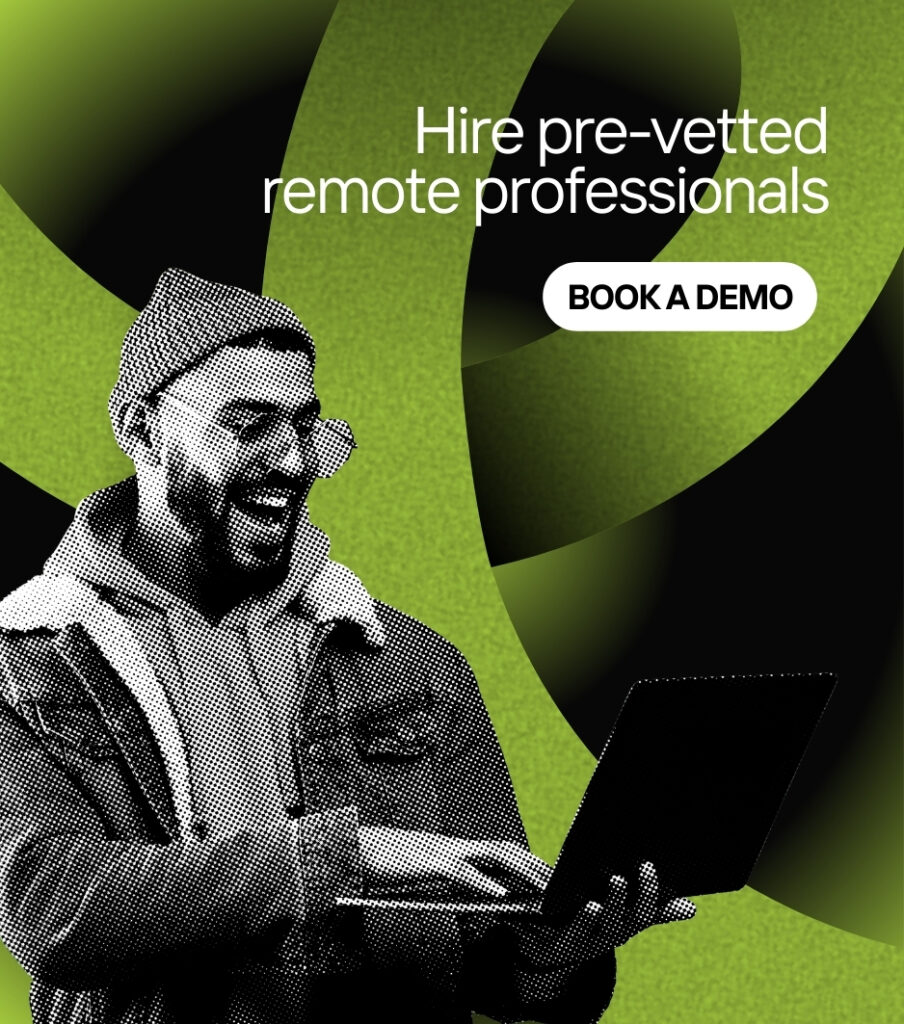
Finding great account executives feels a bit like trying to swipe right on someone who can actually carry a conversation and hit quota. Senior sales talent is hard to find, and even harder to keep, especially when you’re scaling fast.
That’s where offshore remote staffing comes in. More companies are discovering that hiring experienced account executives offshore isn’t just a cost-saving move. It’s a smart, strategic one.
With a certified offshore remote staffing agency like CrewBloom, businesses can tap into global talent who know how to close deals, build relationships, and represent your brand like they’ve been in the same time zone all along (even if it’s technically tomorrow where they are).
What Is an Account Executive (AE) vs. Junior Sales Roles?
If you’ve ever worked in sales, you know there’s a big difference between the person finding the leads and the one closing the deals. Think of it this way: if sales were a band, your SDRs (sales development representatives) are the ones hyping up the crowd, and your account executives are the lead singers sealing the show.
Here’s how they usually differ:
Junior Sales Roles (SDRs/BDRs) | Account Executives (AEs) |
Focus on prospecting: finding leads, sending cold emails, and getting potential clients to say, “Okay, I’ll take the call.” | Focus on closing: Handling demos, answering objections, negotiating, and turning those calls into revenue. |
Usually entry- to mid-level roles where reps build confidence, communication skills, and a thick skin for rejection. | Typically senior-level professionals who can manage longer, more complex sales cycles and high-value clients. |
Metrics revolve around volume: number of calls, emails, or meetings booked. | Metrics focus on results: deals closed, revenue generated, and client retention. |
They’re the openers of the sales process, they warm up the stage. | They’re the closers, the final act that gets the encore (and the commission). |
Great for building pipeline and identifying qualified opportunities. | Great for building relationships and turning opportunities into long-term clients. |
In short: SDRs spark the interest while account executives seal the deal. Both roles are vital to revenue growth, but hiring offshore account executives means you’re adding experienced closers to your team – people who already know how to navigate complex deals, build relationships, and deliver results.
If you’re still building out your outbound team, check out our remote SDR role page to learn how these roles complement each other.
Pros and Cons of Hiring Account Executives Offshore
Hiring offshore account executives is kind of like online shopping. You get access to way more options, amazing quality if you know where to look, and occasionally, a surprise if you don’t partner with the right vendor.
But when done right, offshore remote staffing can give your sales team the boost it’s been waiting for. Here’s a quick look at what’s great and what you’ll want to watch out for:
Pros | Cons |
Cost Efficiency: You get experienced sales talent at a fraction of the cost of local hires. | Time Zone Juggling: If you’re not using scheduling tools, someone’s going to end up joining a call at 3 a.m. (and nobody wants that). |
Access to Global Talent: You can tap into professionals who’ve sold across industries and geographies. | Cultural Nuances: Sometimes, humor or tone doesn’t translate perfectly. “Let’s touch base” might sound weird outside LinkedIn-land. |
Scalability: Easily scale your team up or down depending on your growth stage. No messy HR headaches. | Ramp-Up Time: Offshore AEs might need a bit of extra onboarding to learn your brand voice and sales process. |
Extended Coverage: Different time zones mean you can engage leads while your onshore team sleeps. | Initial Trust Gap: Some managers need time to adjust to managing offshore teams remotely; it’s more about mindset than skill. |
Certified Partnerships: Working with verified staffing companies ensures compliance, experience, and quality hires. | Communication Tools Dependence: You’ll rely heavily on video calls, CRMs, and project management tools to stay aligned. |
At the end of the day, hiring offshore account executives is less about saving money and more about scaling smart. You’re building a global sales force that can sell, adapt, and close no matter where they are, which, in 2025, is pretty much the dream.
If you want to see how this model compares cost-wise, check out our guide on the cost of offshore staffing.
Skills, Language, Sales Cycles, and Cultural Expectations
Here’s the thing about hiring offshore account executives: you’re not just outsourcing tasks; you’re expanding your team’s brainpower. Offshore account executives today aren’t the “backups” of your sales department. They’re smart, strategic, and often just as experienced (if not more) than their onshore counterparts.
So, what should you actually expect from them?
- Strong Communication Skills: Many offshore account executives, especially from the Philippines, have excellent English proficiency and can handle client-facing conversations effortlessly. They understand tone, nuance, and when not to say “per my last email.”
- Sales Cycle Mastery: Offshore account executives are often well-versed in both short and long sales cycles, from quick SaaS deals to those six-month enterprise marathons. They know how to stay patient when a prospect says, “Let’s revisit this next quarter” (aka the sales version of being friend-zoned).
- Cultural Adaptability: The best offshore account executives know how to mirror communication styles: formal when needed, casual when the vibe calls for it.
- Tech-Savviness: These pros aren’t intimidated by CRMs or sales tools. Whether it’s HubSpot, Salesforce, or Pipedrive, they can log, track, and forecast faster than you can say “pipeline hygiene.”
- Strategic Thinking: Offshore doesn’t mean entry-level. Many account executives come with years of experience working for global clients, understanding buyer psychology, and managing accounts across regions and time zones.
When you hire offshore account executives through a certified partner like CrewBloom, you’re getting a sales partner who knows how to close deals and navigate cultural differences like a pro. At the end of the day, good sales is universal. It’s about empathy, timing, and knowing when to stop talking and let the client say, “I’m in.”
Onboarding and Coaching Remote Account Executives
So, you’ve found your dream offshore account executive…congrats! But before you toss them into client calls and say “Go close something,” let’s talk about onboarding.
A remote account executive, no matter how experienced, needs a proper introduction to your company’s sales rhythm. Think of onboarding like a first date. You wouldn’t jump straight to talking about annual revenue targets before even explaining what your company does, right?
Here’s how to set them up for success (and spare yourself some “wait, what’s our discount policy again?” moments):
1. Start with a clear playbook
Don’t just drop a Google Drive link labeled “SALES DOCS.” Build a clear onboarding guide: product knowledge, buyer personas, and your sales process. Make it digestible, not death-by-PDF.
A solid playbook helps your account executive hit the ground running and saves you from answering the same 10 questions every Monday morning.
2. Introduce tools early
Get them comfy with your tech stack on Day 1. CRM access, meeting tools, and your favorite remote team management tools should be ready to go. Bonus points if you teach them the difference between “syncing” and “logging” (because, yes, they’re different).
The sooner they master the tools, the faster they’ll start selling instead of spending an hour figuring out why Google Meet isn’t connecting to HubSpot.

3. Set expectations, not surprises
Outline KPIs, communication norms, and performance goals clearly. Nobody likes mystery metrics or surprise evaluations two weeks in. Transparency from the start sets the tone and keeps everyone on the same page.
4. Assign a mentor or buddy
Pair your new account executive with someone who’s been around the block. A seasoned teammate can help them understand your internal jokes, unwritten rules, and which Google Chat channels are actually important. This not only helps with faster ramp-up but also makes them feel part of the culture, not like an outsider dialing in from another timezone.
5. Simulate real sales calls
Before going live, let them shadow a few calls or run mock demos. It’s the best way to gauge tone, flow, and how they handle tricky objections like, “Let me talk to my team.” It’s a safe space to mess up, laugh about it, and learn – all without accidentally losing a deal in the process.
6. Coach consistently (Not just when there’s a problem)
Schedule regular 1:1s and feedback sessions. Great coaching isn’t about fixing mistakes — it’s about reinforcing what’s already working. Think less “micromanagement,” more “growth partnership.”
When feedback feels like collaboration instead of correction, you’ll see motivation and conversions skyrocket.
Remember: onboarding isn’t a one-week checklist; it’s an ongoing process. The goal is to help your remote account executive feel confident, connected, and ready to close deals.
Final Takeaways
Hiring offshore account executives is about building a smarter, stronger, and more scalable sales team. With the right onboarding, coaching, and partnership, your offshore account executives can close deals, build relationships, and drive growth just like your local team (minus the extra overhead).
Ready to see how offshore remote staffing can help you scale your sales force? Book a discovery call with CrewBloom today.
FAQs
What does an offshore account executive do?
An offshore account executive handles client relationships, demos, negotiations, and deal closures remotely. They function just like in-house account executives, only with added flexibility and cost efficiency.
Are offshore account executives as effective as local hires?
Yes. They bring global experience, excellent communication skills, and proven sales expertise to the table.
How do I manage and track the performance of offshore account executives?
Use shared CRMs, dashboards, and regular check-ins to keep everyone aligned. Clear KPIs and consistent communication make performance management easy and transparent.
Is it safe to hire offshore account executives from another country?
Absolutely. Working with certified offshore staffing partners ensures legal compliance, secure contracts, and data protection every step of the way.







